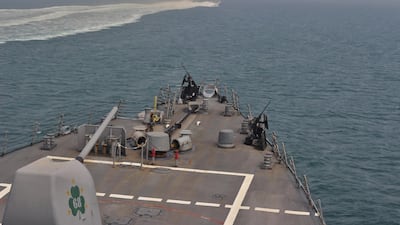A top US naval commander has pledged to defend critical shipping routes through the Red Sea and Arabian Gulf from Iranian threats, whose “malign interests” play a destabilising role across the region.
“We stand ready to protect the flow of commerce and freedom of navigation” in the region, US 5th Fleet commander Vice Admiral Scott Stearney told reporters on Sunday.
Speaking during a teleconference from the 5th Fleet’s headquarters in Manama, Bahrain, Vice Admiral Stearney was responding to recent threats to global shipping at the narrow choke points of the Strait of Hormuz and the Bab Al Mandeb.
_______________
Read more:
US Centcom chief visits Yemen in warning to Iran
Beyond the Headlines podcast: Why the Strait of Hormuz is so important
_______________
Last month, a top Iranian general claimed that its navy had taken full control of the Arabian Gulf and Strait of Hormuz.
"All the carriers and military and non-military ships will be controlled and there is full supervision over the Arabian Gulf. Our presence in the region is physical and constant and night and day," Gen Alireza Tangsiri, the head of the navy of Iran's Revolutionary Guards, said in a quote which appeared in English on the Tasnim news agency.
The 33-kilometre strait separating southern Iran from the Arabian Peninsula is a key global shipping artery.
A third of the world’s seaborne oil passes through it each day, travelling from Middle Eastern producers to markets in Asia, Europe and North America.
Iran has previously threatened to block oil shipments through the waterway in response to the United States escalating sanctions against Tehran.
"We can ensure the security of the Arabian Gulf and there is no need for the presence of aliens like the US and the countries whose home is not in here," said Gen Tangsiri.
But Vice Admiral Stearney, who described Iran’s posture as “unhelpful”, said the US presence aimed to preserve security and stability in the region.
“We’re well-postured to address anything that threatens our interests or our ships,” he said, despite the “very provocative comments and threats that Iran has been making in the press”.
_______________
Read more:
Iran using civilian flights to smuggle weapons to Hezbollah
Iran tested anti-ship missiles in Strait of Hormuz
_______________
Vice Admiral Stearney was also critical of the role Tehran plays in the conflict in Yemen, claiming that Iranian support for the Houthi rebels enabled them to threaten the shipping route through the Bab Al Mandeb.
“Iran continues to develop advanced ballistic missile capability and transfer them to the Houthis and Hezbollah,” he said, “which will allow them to further destabilise the areas of the region that is in their malign interests.”
The 5th Fleet’s area of operations includes the Arabian Gulf, the Red Sea and parts of the Indian Ocean. The fleet, whose aircraft carriers recently launched brand new F-35 stealth fighters, is currently conducting four naval exercises focused on the three critical congestion points of the Suez Canal, Bab Al Mandeb and the Straits of Hormuz.
“These combined exercises show that the US and its partners stand ready to defend the free flow of shipping,” said Vice Admiral Stearney.
These exercises were not in response to Iranian posturing on the Strait of Hormuz or recently reported smuggling activities in the Gulf of Aden.
“All of our exercises were planned well prior to any of the recent events,” said Vice Admiral Stearney. “These exercises are not in response to any one action or threat in particular.”
The region’s maritime routes are critical to the flow of commerce worldwide, he concluded. “We are here for the stability and the security of this region.”

